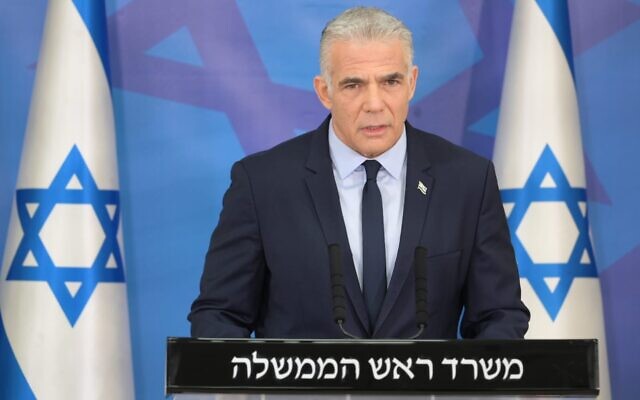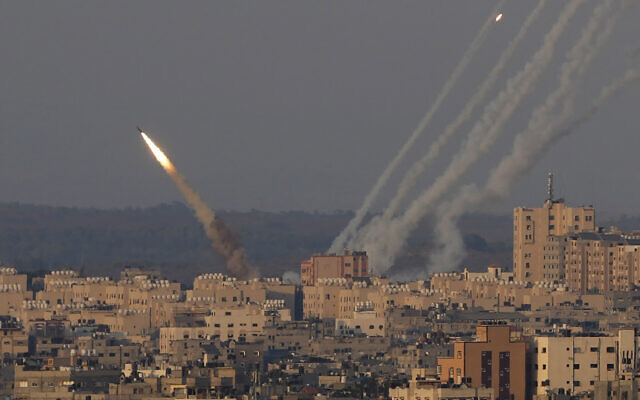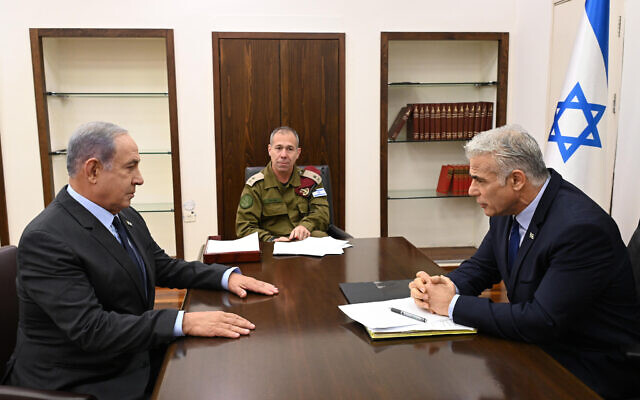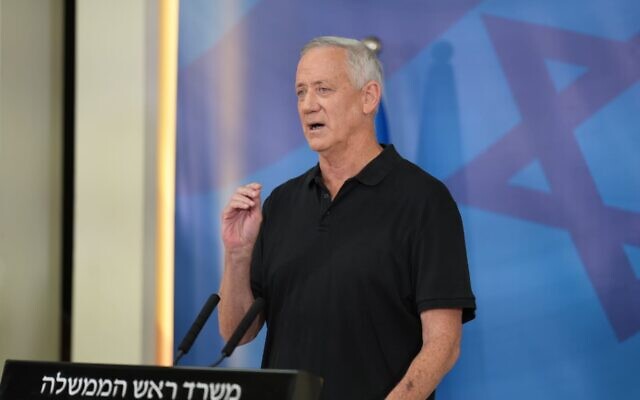As fighting ends, PM says Abraham Accords can be an alternative model for Gaza: ‘There is another way’; Gantz says Israel will keep using preemptive strikes to maintain security

In his first public statement since the close of the three-day military operation against the Palestinian Islamic Jihad terror group in the Gaza Strip, Prime Minister Yair Lapid addressed Gazans and said, “There is another way,” pointing to the Abraham Accords as a potential paradigm of peace, rather than war.
“I want to turn from here to the residents of Gaza and tell them: There is also another way. We know how to protect ourselves from anyone who threatens us, but we also know how to provide work, livelihood, and a life of dignity to anyone who wants to live in peace by our side,” Lapid said in televised remarks made from the Israel Defense Forces’ Tel Aviv headquarters.
“There is another way to live. The path of the Abraham Accords, of the Negev Summit, of innovation and economy, of regional development and joint projects. The choice is yours. Your future depends on you,” the prime minister said, in a rare appeal directly to Gazan residents, rather than to their leaders, the Hamas terror group.
His message comes at the close of Operation Breaking Dawn, which Israel initiated to address an immediate terror threat posed by Islamic Jihad against residents of Israel’s south.
The Gaza Strip is controlled by Hamas, which sat out the most recent bout of fighting. Islamic Jihad is a fellow terror group backed by Iran, smaller than Hamas but still well-armed with rockets – over 1,000 of which the group launched at Israel between Friday and Sunday night, when a ceasefire was agreed.
During the operation, Israel killed two senior Islamic Jihad leaders who commanded the northern and southern sections of the terror group’s military apparatus. Lapid boasted that Israel eliminated “the entire military leadership of Islamic Jihad in Gaza” in the three days.

While dealing a blow to Islamic Jihad, Lapid said that Israel would “not apologize” for protecting itself, stressing that special attention was paid to minimize Gazan civilian casualties.
“During the entire operation, a special effort was made to prevent harm to non-involved civilians. The State of Israel will not apologize for protecting its residents with the use of force, but the deaths of innocent people, especially children, are heartbreaking,” Lapid said.
The IDF officially estimates that of the 51 people killed in Gaza during the operation, 24 were Islamic Jihad terrorists, 16 Gazans were killed by misfired Islamic Jihad rockets, and 11 non-combatants were killed in Israeli strikes.
The Gaza Health Ministry, run by Hamas, said that at least 45 Palestinians had been killed, including 15 children, and 360 people had been wounded since Friday. Israel says as many as 12 of the children were killed by misfired PIJ rockets.
Several Israelis were lightly injured by shrapnel during the fighting, or while running for shelter when the rocket sirens sounded.
Continuing the extension of olive branches, Lapid thanked opposition leader Benjamin Netanyahu for putting politics aside and “backing the government” during the recent Gaza conflict.
In addition to thanking the security establishment and Egyptian mediators, Lapid said: “I would also like to thank the opposition and opposition leader Netanyahu, who showed responsibility and backed the government throughout the operation.”

Despite the mutual mudslinging characteristic of current election campaigning, political rivals from across the blocs unified in support for the state and its military, as is characteristic of most Jewish Israeli politicians during a security event.
On Sunday, Netanyahu broke his year-long embargo on receiving security briefings from the outgoing government’s prime ministers, as befits his role as opposition leader. He also immediately came out in support of the military when the operation launched.
In a last whiff of unity, Netanyahu released a video address Monday night – at the same time as Lapid’s press conference – including a rare congratulatory message to the government he has repeatedly lambasted for being weak against terror, saying that “we are all united” when fighting terrorism.
“I congratulate the government, the Shin Bet and our beloved IDF soldiers on another successful operation against terror in Gaza. In the fight against terror, we are all united. There’s no opposition, there’s no coalition,” the opposition leader said.
Carrying the conciliatory note forward, Lapid echoed previous campaign calls for unity across Israeli society, cautioning politically polarized Israelis to “remember that our enemies are outside, not within us.”
“The right way to face our challenges is together,” the prime minister added.

Speaking after Lapid in a joint press conference, Defense Minister Benny Gantz articulated the three clear objectives Israel achieved in the operation: removing the “immediate threat” to residents of the Gaza border region; “maintaining operational freedom of action”; and preserving deterrence against enemies who threaten Israel’s citizens and sovereignty.
“In the future, if necessary, we will conduct preemptive strikes in order to protect the citizens of Israel, its sovereignty and infrastructure. This is true on each of the fronts, from Tehran [Iran] to Khan Yunis [Gaza],” the defense minister added.
Although Hamas prevented further escalation by bowing out of the conflict — serving the interests both of the terror group and Israel – Gantz emphasized that Israel will hold Hamas ultimately responsible for Gaza.
“Hamas bears responsibility for the territory in the Gaza Strip. Where the responsibility is not fulfilled, we will act forcefully, and we will use all the means at our disposal – military and civilian,” Gantz said.
Before the outbreak of fighting, Israel closed its border crossings with Gaza, which prevented 15,000 Gazans with permits from working in Israel over the past week. Additionally, Israel slowed the supply of fuel, which quickly crippled Gaza’s undersupplied power plants and led to widespread, uncomfortable electricity shortages.
Transitioning back into campaign mode, Netanyahu said in his address that, had the coalition that includes the Islamist party Ra’am not fallen in June, the government would not have been able to “fight terror” in the Gaza Strip.
“Only after this government with Ra’am fell, and only after Knesset dispersed, was it possible to go out to this operation,” Netanyahu said in his video message.
“Only a stable government that’s not reliant upon Ra’am and the [majority Arab] Joint List can fight terror,” he continued.
Netanyahu is campaigning against Lapid and Gantz in the November 1 elections. Much of his Likud party’s messaging says that neither will be able to assemble the necessary 61 minimum of the Knesset’s 120 seats to form a coalition without including an Arab party.
As reported by The Times of Israel
